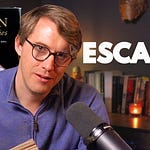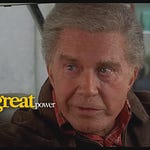Good morning! It’s going to be a great week, I can tell. To start us off, I had the privilege of being interviewed by another Substack, Matthew Freeman’s Ahch-To Baby! An awesome Star Wars analysis Stack’. You can read that interview here and check out Freeman’s work. Above you’ll find a video reading of the whole thing, made specially for Geeky Stoics subscribers. He asks a great series of questions.
This weekend has been a difficult one for me.
Not to get too personal or whine, but my wife and I just completed in September, a renovation of our unfinished basement, which now functions as an office for my work and a second den. It was beautiful. Now it is not. An underground sewer line has busted, and it flooded half the basement and undid all the hard work we put into making it pretty.
I know me. And I know for a fact that two years ago the old me would have lost their damn mind. But as I mention in this video interview above about Stoicism’s founder, Zeno of Citium, the whole reason for studying philosophy is to make good come from “shipwrecks.”
Zeno began his journey to philosophy after being shipwrecked and losing nearly everything, everything but his life. Zeno turned it into an opportunity.
Stoicism is about accepting things as they are. It’s about stubborn realism.
No wasted energy wishing the pipe didn’t break. No headaches over what is beyond your control. I cannot fix this pipe without hiring help. It cannot be done for free. I will have to spend money on this. That’s the end of the story.
What is within my power is whether or not I am a gloomy jerk about it. I can control whether I model courage or anxiety to my teenage daughter, who is observing daily how I respond to crises.
This is what it’s all about.
For some reason, this catastrophic incident hasn’t darkened my mindset too much. And I don’t really know why. I guess it’s just the reps of reading this stuff and then writing to you about it.
Speaking of reading…we have a short video up about developing reading habits that work for you
Anyways….back to the shipwreck
I am sitting in my office on Saturday, December 2nd, with no running water of any kind in the house. My family is out of town for the day, and I’m waiting for the sewer guys to call me back with how much the repair will cost.
But this I’ve seized on to this quiet day as an opportunity to make this video for the newsletter. To write this post. To make two more videos for the Geeky Stoics channel for later in December.
I’ve been shipwrecked. So I might as well make use of it.
This was the idea behind the ending of Star Wars: Ahsoka on Disney+. They are quite literally stranded (shipwrecked) on a faraway planet with no plausible way to ever get home. And Ahsoka’s response to this is in essence, “We’re right where we need to be.” This week, devote your energy to what is within your control. The outcomes will surprise you!
TRANSCRIPT: Ahch-To Baby and Geeky Stoics
FREEMAN: First of all, I came across your Substack when it was called This Is The Way, and you've recently rebranded your content as Geeky Stoics. Why the change?
KENT: Geeky Stoics is a much more clear and precise summation of what our Substack, YouTube and Podcast are all about. Finding wisdom, life advice and specifically connections to the Stoic philosophy within nerd culture. Star Wars will always be our number one love, but the new name gives us a little more latitude to cover movies and shows beyond the galaxy far, far away. Just the other night I was watching The Hobbit (2012) and that scene at the end where Bilbo Baggins reflects on why he wanted to help the dwarves on their quest, really moved me. I'll have a new article up about that on Thanksgiving to teach folks a little about the philosophy of gratitude and connect the dots to some of the writings of C.S. Lewis on how to be more grateful and charitable in daily life.
FREEMAN: When did you first self-identify as a geek?
KENT: Probably by the time I was 15 and standing outside the theater for the Episode III: Revenge of the Sith debut in 2005, fully costumed in DIY Jedi robes and choreographing duels with strangers in the line. I just love this stuff. From making fan films to overanalyzing every facet of fictional lore, I'm happiest around stories and deep fictional characters. Still today in my professional life, I have formed almost all of my most valuable workplace friendships by planting an Ashoka Funko! figure on my desk and waiting to see who wants to talk about it. And there is always someone.
FREEMAN: I'm not familiar with stoicism. Can you tell me more about it?
KENT: Stoicism is an ancient school of philosophy born in Athens, Greece around 300 BC, founded by this guy named Zeno of Citium. Zeno was famously shipwrecked near Athens and lost everything he had. Then he started reading and rebuilt his life as a philosopher in the city. What Zeno could have despaired over he used as the springboard for a new life with a clean slate. His perspective was to frame incredible loss as an opportunity. Stoicism has survived the test of thousands of years by inspiring countless people, the powerful and the powerless alike, to consider that you always have power over how you interpret events that happen in your life. Qui-Gon Jinn is a notably stoic-influenced Jedi Master. His quote, "Your focus determines your reality" in Episode I: The Phantom Menace could be a bumper sticker for what Stoicism is truly about. It's often misunderstood as being a philosophy about dispensing with emotion, but in reality, the great Stoic works are about processing pain, fear, and anxiety, not pretending they don't exist or aren't powerful forces. You have kings such as Marcus Aurelius of the late Roman Empire, and enslaved men like Epictetus in Rome who both contributed to the Stoic tradition. I've been hugely inspired by these writings and once you read them, you see their legacy all over Star Wars most of all. It's all so simply written and fascinating. Stoicism has deepened my obsession with Anakin Skywalker's fall and the decline of the Jedi Order in so many ways. George Lucas was interested in it too while studying at the University of Southern California, in addition to the other great religions and philosophies of the ancient world he layered into Star Wars.
FREEMAN: Tell me about your book, How The Force Can Fix The World. What inspired you to write it?
KENT: Most of my favorite authors have said that when you have a book in you, it's something that just has to come out or you'll go mad. How The Force Can Fix The World was that kind of book for me. It's like I wrote it in my head when I was 15 and spent all my time watching the Star Wars prequels and original trilogy on repeat between hours of playing Star Wars Galaxies, a really cool old Star Wars MMO. Star Wars taught me so much about the virtues of Humility, Empathy, Redemption, Balance, and Courage. I know I'm not alone in that as a Star Wars fan. When I started working in politics I noticed that my friends and colleagues on the opposite end of the political spectrum believed the same things about Star Wars' moral lessons, but held different views in the real world. I found that divide really interesting. We (Star Wars fans) all tend to see something shared and morally common in Star Wars, but then enact those lessons IRL in completely different ways. So this book was me speaking to every Star Wars fan, no matter their political priors, and attempting to share what I think 99% of us see and cherish in these stories that can be applied to real life.
FREEMAN: Reading through your background, it's clear you've spent time in conservative circles. I'm coming from the opposite political perspective. Do you think pop culture is a path to bridge political divides that seem ubiquitous? To increase empathy for one another and find common ground?
KENT: Absolutely. Stories are what glue human beings together when they might otherwise have nothing in common. There are the creation stories of religion, there are the founding stories of nations, both serve a useful purpose in giving people a narrative to understand why they're on this rock here together...and might be best served by working out their differences. When the stories lose touch with the society, things start to come unglued. I think we're seeing that happen in slow motion in the United States. So I am grabbing onto Star Wars for dear life as a 20th century modern myth that has the potential to help us all understand one another better. To me, Star Wars' primary message is …….














